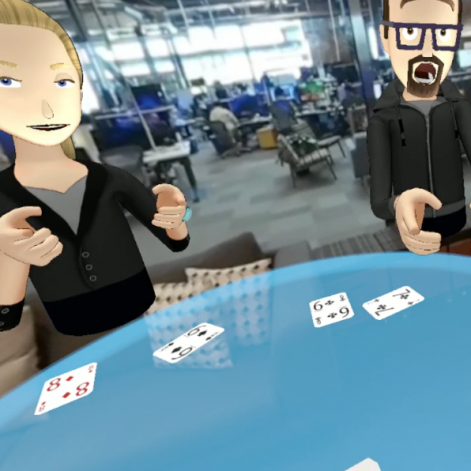There’s no prize for guessing that gambling and porn have frequently become a driving force in the adaptation of innovative technologies up to a critical mass. VR is no exception, as confirmed by Juniper Research. Gambling parlours are determined to increase the amount of VR solutions in the near future, so does that mean the epoch of VR games has already started?
Here’s what Konrad Gill, one of the pioneers in the development and implementation of VR, ViARsys founder, and a keynote speaker at the VR/AR Gambling Conference, had to say on the subject.
I see VR as a natural extension to the casino floor.
Will Virtual Reality in gambling replace classic online slots, board games and live casinos?
Konrad Gill: Like neither video slots and mobile gaming have fully replaced classic mechanical Slots (but recently, we see full convergence and the merge of both types) nor automatic Roulettes have replaced the classic roulette table. And in times of computer, mobile and new upcoming forms of hybrid games, the board game industry has constant new sales records and has been booming over the last few years with no end of the boom in sight.
For the land-based casino and gaming industry, I see VR as a natural extension to the casino floor. Arcades and Casinos have the things that Virtual Reality needs to fully unleash its potential and to excite people for the technology- gaming space, infrastructure, the social aspect and the knowhow of operating & marketing entertainment. On the other hand, VR provides the next step for operators to reach out to customers and offer exciting new forms of interaction and entertainment.
So in my opinion, VR and classic gambling make natural allies and add to each other. With our new venture ViARsys and its ‘VR for the people’ mission, we are aiming to do our part to help achieving this synergy – supporting both the young and creative VR industry as well as the gaming behemoths.

The cards in the game of who will dominate the convergent gaming market are shuffled by VR again.
Will VR affect land-based gambling venues? What is the successful way of development?
The VR industry needs land-based gambling venues as land-based gambling venues need VR to keep the novelty factor and alternative ways of entertainment to pour new clientele into locations and excite the existing customer base.
There is also the other side of convergence: once we see more and fully integrated online convergence, of course, it has charm to play a VR version of your favorite real casino. VR also provides the social aspect that traditional online gaming sites cannot, at the moment. I think the cards in the game of who will dominate the convergent gaming market are shuffled by VR again, but both online and land-based gaming will both continue to exist.
Looking at the current userbase of VR and the obstacles on the road to adoption, I currently also see a higher potential in local pay-per-use experiences and the road to convergent mixed reality casinos leading through the brick and mortar arcades first.

Almost always when experiencing VR in a good setting, people instantly grab the concept and understand how to use it and what you can do with it.
How often can we observe convergence in a gambling environment?
We have to separate 3 main definitions of convergence: technical convergence, legal convergence and User centric convergence, meaning the adaptation of technological trends.
For the technical convergence between online and land-based aspects, it’s already there. We developed fully convergent casino systems several years ago. But this brings me to the second definition of convergence – legal convergence. The casino and gambling industry are a highly-regulated market where many different legislators, regulators and regionally different legal obstacles had and must be overcome.
For the seamless convergence of online, mobile and land-based casino operations, we start to see first big implementations in the last year. In those markets where legislators have seen the advantages of convergence and adopted regulations the user adaptation goes quite fast as many people already know how to use the various parts. Smartphones have done a lot to make people comfortable with technical convergence.
Which brings me to the third definition of convergence – the user adaptation of technology. I do not see a big obstacle here, as our experience in bringing VR to the people has shown that almost always when experiencing VR in a good setting, people instantly grab the concept and understand how to use it and what you can do with it. This has to do with the nature of Virtual Reality being intuitive and natural like no medium before.
The concepts for full mixed reality convergence are already there and we are now in the early phases of adopting it.
The question if humanity will use VR for our benefit or if VR will consume us is not decided yet.
Have you ever had cases that led you to the point of bifurcation, making it clear that you had to choose another vector of movement?
VR, as every revolutionizing technology in history, is full of bifurcation points. So, if I take your question philosophically; yes, there are many points where I thought VR will emerge in one or the other direction. We are now in the process of defining the saddle points of a technology which is still at an early stage adoption and full of evolving nonlinear paths for evolution. Many questions, like in the early days of the printing press, the Internet and 2D computer interfaces, we still agree the parameters, the ‘constitution’ of how we will implement VR into our lives.
Hence, even the question if we, as humanity will use VR for our benefit or if VR will consume us is not decided yet.
VR provides a completely new way of interacting with consumers and providing the experiences they crave.
How do you think what is more important: games for VR users or VR users for gambling business?
In my opinion, Virtual Reality’s adaptation up to a critical mass of customers to justify an industry for VR gambling games will only succeed short to midterm if we bring the technology to the people, meaning to use the infrastructure and know-how of arcades and casinos to let people feel Virtual Reality and to utilise the advantages of the technology. Virtual Reality, on the other hand, provides the entertainment industry, where gambling is an important force, a completely new way of interacting with consumers and providing their clients the experiences they crave (and pay for).
The Gambling industry has what VR needs – gaming space, experience of how to attract people and know-how in operating entertainment. The ViARsys team sees Virtual Reality and the gambling industry as natural allies to bring the technology forward and to the people.
Where do you see the VR Industry? Is VR going to be the ‘next big thing’ in gambling and entertainment, or is there still a chance that the technology will fail and end as a curiosity?
I think VR is over the critical point to question whether the technology will play an important role in our future life or not. The technology and the experience it provides is already mature and only a major force can break its adaptation, but the variables are still plenty.
This is where the gaming industry comes in. It can play a key role to contribute to VR’s road to mass adaptation, a bit like what slot machines and casino games have done for clash of clans and the social gaming sector or photoplay machines for Candy Crush, so to say, to pave the way for the acceptance of new VR systems as a new medium and convergence.
Which market do you think developers wanting to create Virtual Reality gambling applications should focus on; online casino VR games or land-based casino experiences?
I think for VR developers going the route of land-based experience, development will have a higher chance of economic success in the near future. In the end, all sorts of gaming will coexist, in total convergence as well as side by side. But short-term creating land-based VR experiences will provide better opportunities for developers.
At the VR/AR Gambling conference, you will talk about VR and the related gaming convergence. Could you share some aspects of your presentation?
In my presentation, I go through the history of gambling and take out moments of change and convergence like the advent of roulette wheels and therefore the need for stationary casinos rather than private saloon gaming, the influence of slot machines, the computer, videopoker machines, the internet as well as modern convergence systems, and I draw parallels to the current state of VR.













